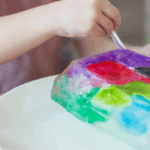
Best baby beginnings: Supporting babies in nurseries
Baby’s brains double in size in the first year of life.
In order to grow and develop, babies need as many quality interactions with caring adults as possible. It is important that if you care for babies, you truly understand the positive impact you can have.
See our top five tips for supporting babies in nurseries:
- Enriching Environment
Practitioners can support healthy brain development in babies by providing a stimulating environment. A baby’s brain immediately begins to form trillions of connections that enable them to see, hear, smell and learn. The practitioner’s role is vital in helping these connections to form by providing babies with exciting and interesting interactions, resources and spaces to play
- Interests
Children’s unique interests are central to tuning them in to learning. By observing children’s interests and responding accordingly, this helps to support and extend their learning and development. Babies enjoy repetitive activities because it helps them to make sense of the world around them, so don’t be afraid to repeat activities that babies enjoy
- Settling-in period
The settling-in period is essential in helping babies to form attachments and positive relationships with their main carers in nursery. Ensure each baby is treated as an individual and take this process at their pace. Some babies will settle quickly, while others may take several more sessions and lots more time to feel fully secure at the setting
- Language development
Language development is crucial for babies, so every opportunity to talk to babies should be taken. Examples include singing songs and rhymes during care routines such as nappy changes, commenting on what you are doing as you move around the room and responding to babies’ gurgles, sounds, gestures and babbles to develop the ‘serve and return’ of conversation
- Learning through experiences
From birth, children learn through experiences in their everyday environment. The opportunity to learn through experimentation and exploration is important for babies to prepare for more formal learning later. Babies enjoy sensory exploration using lights, sounds, and textures supported by an adult. As soon as babies can sit comfortably and can grasp and handle objects, they can be given treasure baskets to explore. Babies gain rich, sensory experiences through mouthing and handling the objects that they select.
In short, the more experiences and interactions that you have with babies, the better for their development. Babies are natural communicators and they will thrive on the positive interactions you give them throughout the day.
Looking for more support?
See our ‘Baby room leader‘ and ‘Exemplary practice with babies‘ online courses or our ‘Brilliant babies‘ live virtual or face to face training.
- Leadership
- PSED
Similar Articles
Top tips: Supporting your team’s well-being

Early years activity: Frozen balloon explorers


